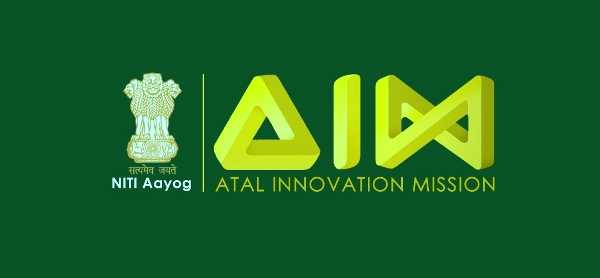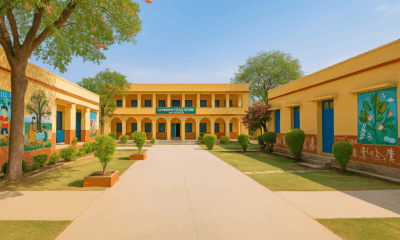Education
Villagers in India Are Bartering Agricultural Products in Return of Education For Their Children
Villages of Bihar and Assam are using barter system for keeping learning going on for their children
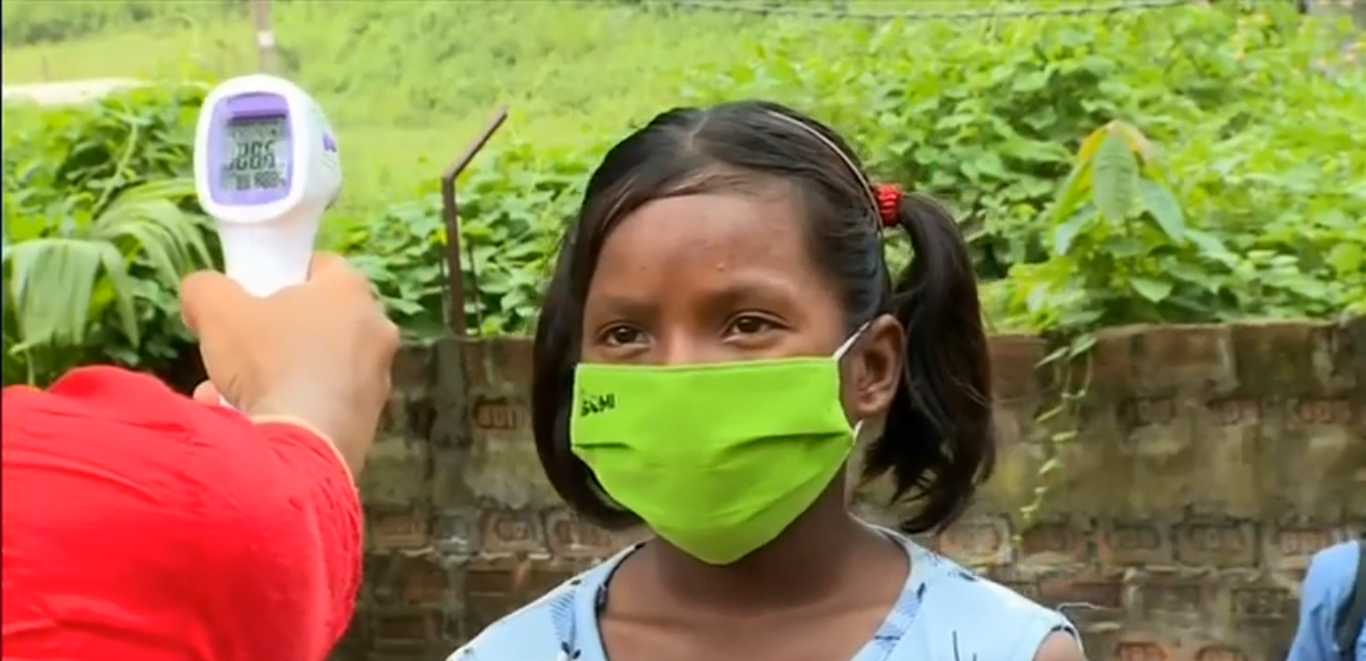
The barter system had been a way of existing in the ancient world when there was no introduction of the standard money in certain civilisations. It was a way of paying for services and products by offering something that belonged to the buyer. Interestingly, some villages in India are back on the same track during the COVID outbreak which mandated closure of their kids’ schools and their businesses.
.jpg )
As online classes could not pan out much in these areas, majorly due to the bad network connectivity, the government started classes that aired on television in the initial stage of the lockdown. But this idea, too, couldn’t survive as not all families own TVs in rural India.
This ultimately gave rise to makeshift classes organised by the village teachers, wherein the classes are now conducted in the open fields with masks on.
.jpg )
Here, these teachers don’t get paid money but vegetables, grains and other agriculture products that the parents of these students grow in their fields and can happily afford as the fees. Talking about this barter system, Shivjyoti Kumar, a farmer from Nayagaon in Bihar, tells Indian Express, “Wheat is our cash, several farmers give wheat as tuition fee on most occasions, the teacher charges Rs 1,000 per month for teaching for an hour daily.”
These poor farmers aka parents don’t mind sharing their produce as long as their kids are getting educated while the local schools are closed.
Most of these children are first-generation learners, which means it is difficult for them to study by themselves even if they could afford to take online classes. “Self-study does not work beyond a point. We are happy that our parents are so conscious about our education,” Shivjyoti’s daughter, Nishu, says.
.jpg )
However , the question here remains – for how long will the teachers be willing to teach once the farmers run out of the commodities to barter for their child’s education. Sadly, well-deserved education is a far fetched dream for a lot of people in our country due to the economic and digital divide.
Source: BBC
Education
Judicial Guardrails: How the J&K High Court’s Fee Regulation Verdict Redraws the Rules for Private Schools
In a judgment that goes far beyond school fees, the High Court of Jammu & Kashmir and Ladakh has reset the conversation around private education governance. By reaffirming institutional autonomy while retaining safeguards against profiteering, the ruling signals a shift toward smarter, evidence-based regulation. For school leaders, policymakers, and parents alike, this decision offers both reassurance and a roadmap for how India’s evolving education ecosystem might be governed in the years ahead.
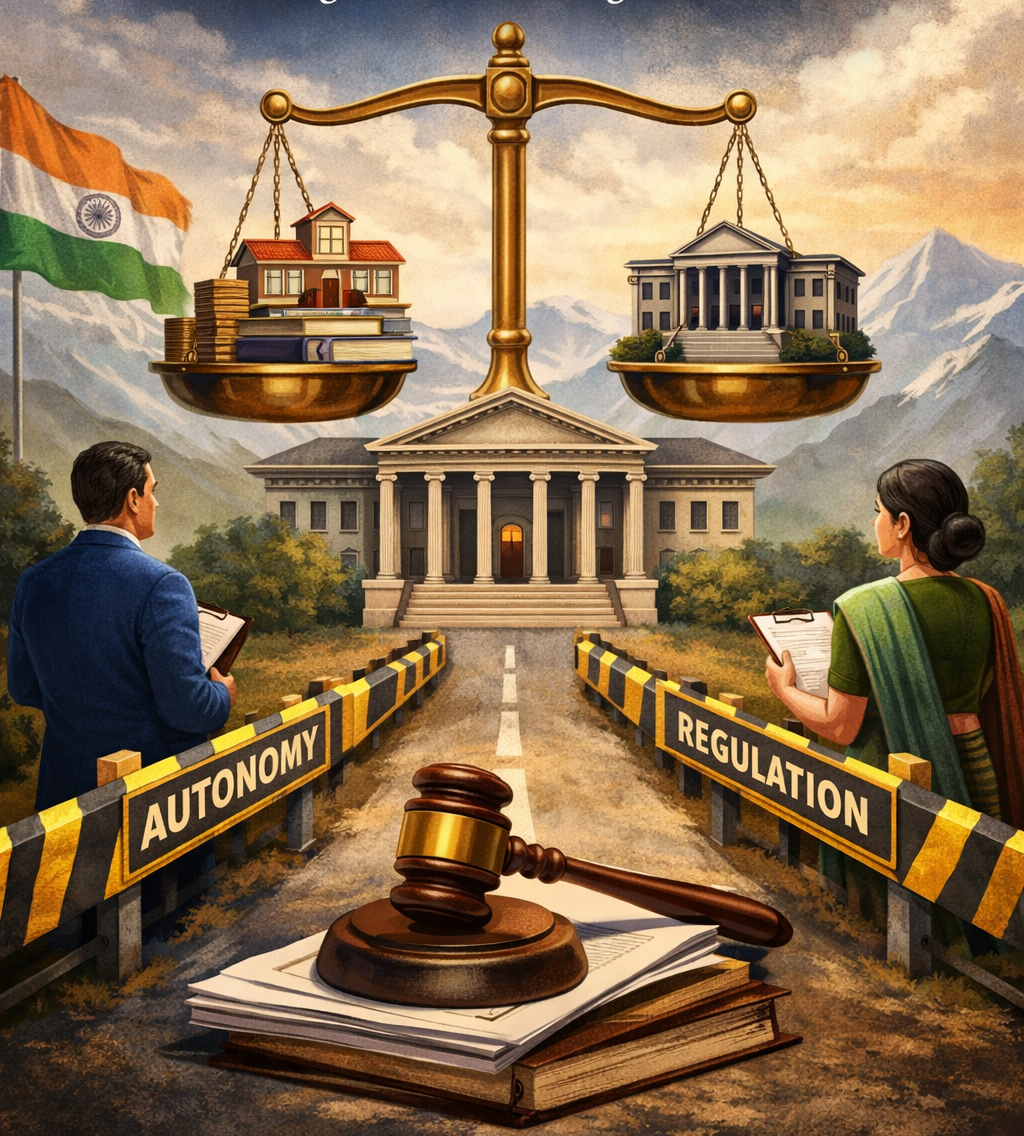
A Courtroom Decision That Echoes Across Classrooms
Every so often, a legal judgment does more than resolve a dispute—it reframes an entire conversation.
The recent ruling of the High Court of Jammu & Kashmir and Ladakh in New Convent High School & Ors vs Union of India is one such moment. While the immediate issue concerned fee regulation, the implications extend to the deeper question that has shaped Indian education policy for decades:
Who should decide how private schools operate—the State, or the institutions themselves?
The Court’s answer is neither absolute freedom nor rigid control. Instead, it draws a clear set of judicial guardrails—protecting institutional autonomy while preserving regulatory oversight to prevent exploitation.
From Supplementary to Structural: The Private School Reality
Perhaps the most striking element of the judgment is its candid acknowledgement of a reality educators and parents already understand.
Private schools are no longer merely supplementary to government schooling. In many regions, they have become structurally central to delivering education.
Families across socio-economic segments increasingly choose private institutions because of:
-
Perceived better learning outcomes
-
Stronger infrastructure
-
Greater accountability
This acknowledgement matters because it shifts the policy lens from ideology to practicality. Regulation designed for a marginal sector no longer fits a system where private institutions educate a significant proportion of children.
The End of Executive Overreach
At the heart of the case was the composition of the Fee Fixation and Regulation Committee (FFRC). A provision allowed a senior government officer to head the body.
The Court ruled that regulatory mechanisms exercising quasi-judicial powers must be independent. By reaffirming that such committees should be chaired by a retired High Court judge, the Bench effectively insulated fee oversight from administrative influence.
For the education ecosystem, this is a structural shift:
-
Greater procedural fairness
-
Increased confidence among institutions
-
More credibility in regulatory decisions
In essence, the Court strengthened the legitimacy of regulation—rather than weakening it.
Education: Neither Charity Nor Commerce
One of the most important clarifications in the judgment concerns the economics of schooling.
The Court reiterated a long-standing legal principle: running a school is a constitutionally protected occupation.
This has several implications:
-
Schools may generate a reasonable surplus
-
Investment in infrastructure and faculty is legitimate
-
Financial sustainability is necessary
What remains prohibited is profiteering—defined as excessive or exploitative gain.
This distinction is critical in a policy environment where financial viability is often confused with commercialization.
Quality education requires:
-
Qualified teachers
-
Modern facilities
-
Technology
-
Safe transport
All of these demand sustained investment.
Smarter Regulation, Not Blanket Control
Another major takeaway is the Court’s push toward proportionate oversight.
Rather than attempting to scrutinize every school equally, regulatory authorities are encouraged to:
-
Focus on cases where credible complaints arise
-
Examine institutions where fee levels appear unreasonable
-
Ordinarily accept fee proposals supported by documentation
This is essentially a call for risk-based regulation—a governance model common in mature regulatory systems.
It recognises a simple truth: excessive micro-management can harm quality as much as inadequate oversight.
The Transport Fee Conversation
The judgment also addressed the long-standing friction around school transport fees.
It noted that transport services are optional facilities provided for parental convenience—not mandatory for school recognition.
The Court recommended that any fee determination in this area involve domain experts—transport authorities, fuel cost data, and related agencies—to ensure realism and transparency.
This highlights an important gap in many regulatory systems: decisions often lack sector-specific cost benchmarking.
Key Takeaways
For the Education Sector
-
Private schools are now structurally embedded in India’s education ecosystem.
-
Financial sustainability is legitimate; profiteering is not.
-
Regulatory independence is essential for credibility.
For Policymakers
-
Blanket fee controls are less effective than evidence-based oversight.
-
Public education reform remains urgent and central.
-
Regulation must balance equity with institutional viability.
For Parents
-
Safeguards against exploitation remain intact.
-
Transparency in fee determination is being strengthened.
What’s In It for Me? (School Leaders Edition)
1. Greater Institutional Confidence
The judgment reinforces that:
-
Schools retain autonomy in proposing fee structures.
-
Regulatory decisions must follow due process.
2. Financial Sustainability Is Legitimate
Reasonable surplus for:
-
Infrastructure
-
Faculty quality
-
Expansion
is not only permitted—it is recognised as necessary.
3. Transparency Is Now Strategic, Not Optional
Clear documentation of:
-
Costs
-
Investments
-
Salary structures
will strengthen credibility during regulatory review.
4. Reduced Risk of Arbitrary Intervention
Authorities are expected to intervene primarily when:
-
Complaints arise
-
Fee structures appear excessive
This creates a more predictable operating environment.
5. A Shift Toward Collaborative Governance
The ruling signals an emerging model where:
-
Schools and regulators are partners
-
Oversight is consultative rather than adversarial
The Larger Policy Question India Cannot Ignore
Perhaps the most uncomfortable yet necessary observation in the judgment is its implicit challenge to governments.
Regulating private schools cannot compensate for weaknesses in the public system.
If private institutions are expanding because parents seek reliability and quality, the long-term solution lies not in tighter control alone, but in strengthening government schools.
India’s future education landscape will likely depend on a balanced ecosystem where:
-
Public schools ensure equity
-
Private schools drive innovation
-
Regulation ensures fairness
The Road Ahead: From Control to Collaboration
The High Court’s verdict does not dismantle regulation. It refines it.
It suggests a governance model built on:
-
Independence
-
Transparency
-
Proportional oversight
-
Institutional accountability
For India’s education sector, the message is pragmatic:
Autonomy and accountability are not opposing forces—they are mutually reinforcing.
If applied thoughtfully, this ruling could mark the beginning of a more mature policy phase—one where the focus shifts from controlling institutions to enabling quality.
Because in the end, the real beneficiary of balanced governance is neither the State nor the school—it is the student.
Education
Supreme Court’s Landmark Judgment for Schools: Menstrual Health is a Fundamental Right
In a transformative judgment delivered on January 30, 2026, the Supreme Court of India has unequivocally placed menstrual health within the ambit of fundamental rights, linking dignity, education, and equality in classrooms across the country. This ruling goes beyond infrastructure mandates to address stigma, awareness, and school culture—reshaping how institutions must support adolescent girls. ScooNews breaks down what the judgment says and what it now requires every school leader to do.

In a landmark judgment that firmly connects constitutional law with everyday classroom realities, the Supreme Court of India has declared menstrual health a fundamental right, placing it squarely within the ambit of Article 21 (Right to Life with dignity) and Article 21A (Right to Education).
Delivered on January 30, 2026, by a Bench of Justices J.B. Pardiwala and R. Mahadevan, the ruling in Jaya Thakur vs Union of India goes far beyond symbolic recognition. It lays down clear, enforceable obligations for schools—government and private alike—transforming menstrual hygiene from a welfare measure into a constitutional duty.
For school leaders, this judgment marks a decisive shift: menstrual dignity is no longer optional, charitable, or discretionary. It is a core educational standard.
Why the Court Intervened
The Court acknowledged what educators and parents have long known but systems have often ignored:
lack of menstrual hygiene support is a direct barrier to girls’ education.
Absenteeism, discomfort, fear of embarrassment, inadequate toilets, and social stigma collectively push many girls out of classrooms—sometimes temporarily, sometimes permanently. By recognising menstrual health as integral to dignity and learning, the Court affirmed that no girl should ever have to choose between her education and her period.
What the Court Said
The judgment rests on three powerful principles:
- Menstrual health is inseparable from dignity and bodily autonomy, which are central to the Right to Life.
- Education cannot be meaningful if menstruation becomes a reason for exclusion, discomfort, or discrimination.
- Infrastructure alone is insufficient—social stigma, silence, and male insensitivity must also be addressed.
In a telling observation, the Court noted that “ignorance breeds insensitivity” and warned that menstrual facilities will remain underused unless schools actively dismantle stigma.
What Schools Must Now Do
The Court’s directions are both practical and time-bound, with a three-month implementation window. They fall into two clear buckets: infrastructure and ecosystem change.
-
Physical Infrastructure: The Non-Negotiables
All schools—government and private—must ensure:
- Free provision of biodegradable sanitary pads, with a preference for discreet access such as vending machines.
- Functional, gender-segregated toilets with running water, soap, privacy, and regular maintenance.
- Disabled-friendly sanitation facilities, ensuring inclusivity for all students.
- Safe and hygienic disposal systems, including covered bins and environmentally compliant solutions.
- Creation of a Menstrual Hygiene Management (MHM) Corner stocked with emergency supplies such as spare uniforms, innerwear, and hygiene kits.
The Court made it clear that absence of these facilities amounts to denial of constitutional rights.
-
Cultural & Educational Shift: The Ecosystem Solution
Perhaps the most progressive aspect of the ruling is its insistence that menstrual health is not a “girls-only issue.”
Schools are now expected to:
- Sensitise boys about menstruation as a normal biological process, removing shame, jokes, and harassment from school spaces.
- Train male teachers and staff to respond empathetically to menstruation-related needs, without interrogation or embarrassment.
- Integrate age-appropriate, gender-responsive content on menstruation and puberty into health and wellness curricula, in line with NCERT/SCERT guidance.
- Foster a school culture where menstruation is discussed openly, respectfully, and without euphemism.
The message is unambiguous: pads without dignity do not equal access.
A Clear Warning to Private Schools
The Supreme Court issued a firm caution to private institutions:
non-compliance can lead to de-recognition.
By linking menstrual hygiene directly to the Right to Education, the Court has placed accountability squarely on school managements. Compliance is no longer a matter of reputation—it is a legal obligation.
Why This Judgment Matters
This ruling represents a rare moment where law, education, health, and gender equity intersect meaningfully.
It acknowledges that:
- Equality in education requires both facilities and acceptance
- Silence around menstruation is itself a form of discrimination
- Boys and men must be part of the solution—not bystanders
For school leaders, this is an opportunity to lead with empathy, foresight, and constitutional responsibility.
The Bottom Line
The Supreme Court has drawn a clear line:
menstrual dignity is a right, not a favour.
Schools that act decisively now will not only meet compliance requirements but will also create environments where every student feels safe, supported, and respected—every day of the month.
Education
Beyond the First Bell: 5 Key Takeaways for School Leaders from Economic Survey 2025–26
The Economic Survey 2025–26 signals a definitive pivot in India’s education strategy. While infrastructure goals have largely been met, the focus now shifts to bridging the higher secondary gap and fixing a vocational training deficit that remains under 1%. For school leaders, success is no longer measured by enrolment, but by measurable competencies, digital wellness, and global readiness.

The Economic Survey 2025–26, tabled in Parliament on January 29, 2026, presents an arresting paradox. India has successfully built one of the world’s largest schooling systems—educating 24.69 crore students—yet only six out of ten learners complete higher secondary education.
For school leaders, the Survey’s message is unambiguous: the national focus is shifting from inputs (getting children into school) to impact (ensuring they learn, progress, and stay). What follows are five findings that matter most inside the school gate.
1. The “Leaky Bucket”: Transitioning from Middle to Secondary
While primary enrolment is near-universal (90.9%), the Survey identifies a structural drop-off after Class 8.
Reality check: The Net Enrolment Rate (NER) at the secondary level stands at just 52.2%.
The rural gap: Only 17.1% of rural schools offer secondary education, compared to 38.1% in urban areas. Longer travel distances and higher costs lead to significant transition losses.
What this means for schools:
- The Survey strongly backs Composite Schools (K–12 models) to reduce dropout risk.
- Schools serving Classes 6–10 should prioritise transition counselling, parent engagement, and academic bridging.
Leader takeaway: Retention, not recruitment, is now the real leadership challenge.
2. Learning Outcomes: The PARAKH Recovery Story
Post-pandemic recovery is visible, particularly in foundational years—but learning quality remains uneven across states and school types.
Encouraging gains:
- Grade III Mathematics proficiency has risen to 65%, up from 42% in 2021.
What’s next:
- The Survey proposes a PISA-like, competency-based assessment at the end of Class 10, signalling a decisive move away from rote learning.
What this means for schools:
- Internal assessments will increasingly need to mirror National Achievement Survey (NAS) benchmarks.
- Performance-linked accountability is no longer hypothetical—it is imminent.
Leader takeaway: Assessment literacy will become as important as curriculum delivery.
3. The Skilling Crisis: Addressing the 1%
Perhaps the most candid section of the Survey exposes a stark education–employment mismatch.
The 1% problem: Only 0.97% of students aged 14–18 have received formal institutional skilling.
Structural issue: Education and skilling continue to operate in parallel silos, leaving most learners academically qualified but workplace-unready.
What this means for schools:
- Vocational exposure must be embedded within Classes 9–12, not offered as an optional or external add-on.
- Partnerships with local industry, NSDC-aligned providers, and apprenticeship platforms will become critical.
Leader takeaway: Schools that integrate skills early will future-proof their students—and their relevance.
4. Digital Exposure: Pedagogy vs. Addiction
In a significant first, the Economic Survey flags digital addiction as a threat to student wellbeing, learning focus, and social capital.
The paradox:
- 89% of rural youth now have access to smartphones.
- 75% use them primarily for social media, contributing to sleep deprivation, reduced attention spans, and anxiety.
What this means for schools:
- The Survey recommends introducing a Digital Wellness Curriculum, covering:
- Screen-time literacy
- Cyber safety
- Responsible AI and social media use
Leader takeaway: Digital fluency must now include digital restraint.
5. Global Ambitions: Stemming the Student Exodus
India is on track to become the world’s largest source of international students, with outbound numbers expected to reach 18 lakhs by 2025. Yet, international students form just 0.10% of domestic enrolment.
The strategy:
- The Survey promotes “Internationalisation at Home”—inviting foreign campuses, enabling joint degrees, and ensuring mutual recognition of qualifications.
Key enablers already in place:
- Academic Bank of Credit (ABC)
- APAAR IDs (with 2.2 crore already issued)
What this means for schools:
- Senior secondary students should be actively guided on credit portability, interdisciplinary choices, and global pathways.
Leader takeaway: Global readiness is no longer optional—it is systemic.
The Bigger Shift: Learning Over Schooling
The Economic Survey 2025–26 makes one thing clear: India’s education mission has entered its second phase. Infrastructure and access have largely been achieved. The next frontier is retention, relevance, and real learning.
For school leaders, success will no longer be measured by enrolment numbers alone, but by:
- Meaningful learning outcomes
- Student wellbeing and digital balance
- Employability and global mobility
The bell has rung. What happens after it now matters more than ever.
Education
What the Indian Army Teaches Our Children Beyond Textbooks
By viewing the Indian Army as a living classroom, I see that true leadership stems from selfless service and integrity, not authority. To me, discipline is freedom—the capacity to make ethical choices and remain resilient under pressure. By fostering teamwork and active patriotism through simple, honest deeds, I believe education can transcend academics. My goal is to develop compassionate, self-confident citizens who view challenges as growth and contribute meaningfully to our nation.
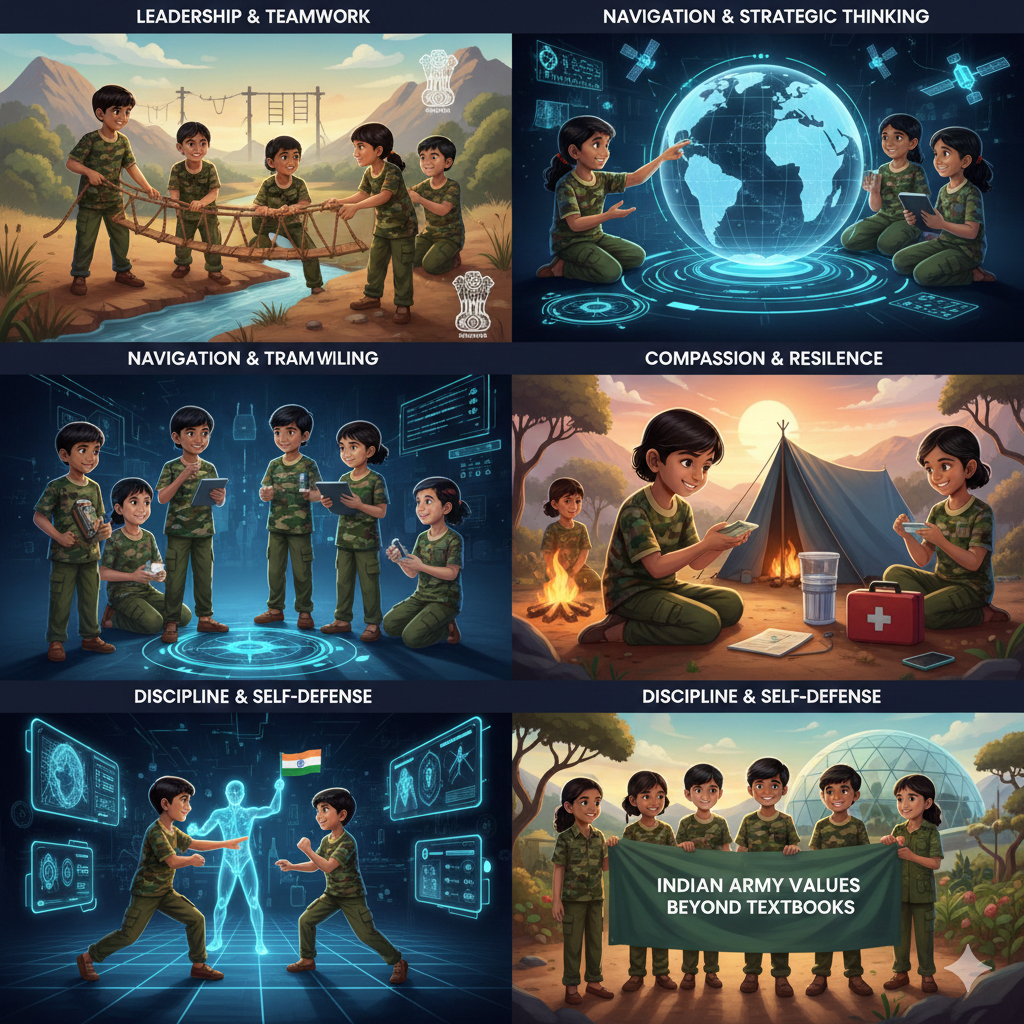
Real-world values will shape the way students see the world around them and what they value most; such as, the Indian Army serves as a living classroom, teaching students leadership, courage, and selflessness through action. Through the actions of each soldier, a student learns that the most important form of leadership comes from being committed to a purpose that is larger than themselves; that leadership is not defined by one’s authority, but rather by the way each individual serves others, holds to their integrity and is steadfast during the most difficult of times.
Discipline is one of the Army’s greatest lessons, but it is also frequently misinterpreted as control. In reality, discipline is a means to provide freedom: freedom to make ethical decisions, act responsibly, and focus when stressed. This lesson of discipline is an essential lesson for children and will help children achieve their true potential through the routines built to help them grow to become trustworthy individuals.
As soldiers, children acquire many skills and knowledge that help them cope with difficult situations and disappointments. They learn how to work together, trust and support each other And recover from their mistakes. All these lessons work together to help a student learn that disappointment is only a step/stage in life; not the finish line. Whether it be in the classroom or on the playground: teaching children emotional strength, working as part of a team and persevering will prepare children not only for the next exam but for life itself.
Patriotism is an action rather than a word. The example of the Indian Army teaches children that love of nation is shown by simple deeds such as being honest, respectful, disciplined and responsible towards one’s community. Schools can make patriotism a part of daily experience instead of just talking about it.
Education needs to model itself after the Indian Army, if it wants to develop citizens who contribute meaningfully to society, and not just create scholarly students. Schools should develop students into people who are self-confident, compassionate, disciplined, generous, strong in values, and are future leaders that support the growth of their country through their successes.
“Discipline and united action are the real source of strength for a nation.” — Field Marshal Sam Manekshaw
About the Author:
Ms. Sonal Sharma is the Principal, Birla Open Minds International School, Yavatmal . She is passionate about empowering both educators and learners by creating engaging, impactful, and innovative training experiences.
Education
AI to Become a Core Subject from Class 3: India’s Big Leap Toward a Future-Ready Generation

In a landmark move to make India’s school system future-ready, the Department of School Education & Literacy (DoSE&L), Ministry of Education, has announced that Artificial Intelligence (AI) and Computational Thinking (CT) will be introduced as part of the school curriculum from Class 3 onwards, beginning in the academic year 2026–27.
The initiative marks a major step in preparing students for an AI-driven world, ensuring early exposure to technological literacy, ethics, and problem-solving. The curriculum, currently being developed through a consultative process with CBSE, NCERT, KVS, NVS, and States/UTs, will fall under the National Curriculum Framework for School Education (NCF-SE) 2023, in alignment with the National Education Policy (NEP) 2020.
A stakeholder consultation held on 29th October 2025 brought together education leaders, including Prof. Karthik Raman from IIT Madras, who heads the CBSE expert committee responsible for shaping the AI & CT curriculum. The focus is on designing a meaningful, inclusive framework that integrates AI not as an advanced elective but as a foundational skill — comparable to literacy and numeracy in importance.
Shri Sanjay Kumar, Secretary, DoSE&L, emphasised that AI education should be viewed as a universal skill closely linked to real-world applications. “Every child’s distinct potential is our priority. Policymakers must define minimum thresholds and evolve them with changing needs,” he said. He also stressed on teacher training as the backbone of successful implementation, with modules under NISHTHA, and resource materials being prepared by NCERT and CBSE.
The Ministry plans to release AI handbooks and digital resources by December 2025, followed by a grade-specific rollout supported by video-based learning materials and structured training.
By embedding AI education from the foundational years, India aims to nurture a generation that understands, creates, and applies technology ethically — transforming the vision of AI for Public Good into everyday classroom reality.
Education
Dharav Utsav to Celebrate Rajasthan’s Cultural Heritage and Local Talent

Education
How to Build Better Parent-Teacher Communication
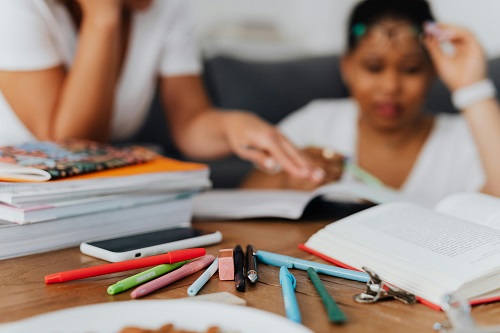
Good communication between parents and teachers plays an important role in a child’s learning and confidence. When both stay connected, it helps students feel encouraged and understood. Still, it’s not always easy to keep that connection strong. Busy schedules and small misunderstandings can make things tricky. The good news is that a few simple habits can make a real difference. Let’s examine what parent-teacher communication truly entails and how both parties can collaborate more effectively.
What is Teacher and Parent Communication?
Teacher and parent communication is all about staying connected and working together for a child’s growth. It’s not just a one-time meeting or message but a continuous, two-way exchange of updates, ideas, and feedback. When teachers and families stay in touch regularly, it creates a strong support system that helps students do better both in and outside the classroom.
In simple terms, teachers share what’s happening at school, like:
- Homework and assignments
- Grades and test results
- Class activities and behavior updates
- Social and emotional progress
- Strengths and areas where a student might need extra help
At the same time, parents share what’s happening at home, such as:
- How the child feels about schoolwork
- Any challenges or changes they’ve noticed
- Questions or suggestions about learning support
When both sides keep the communication open, it builds trust and teamwork. Teachers understand students better, and parents feel more involved in their child’s education.
Tips for Smooth Parent-Teacher Communication
Talking to parents doesn’t have to feel formal or uncomfortable. In fact, the better your connection with them, the smoother your teaching journey becomes. Whether you’re reaching out for the first time or trying to keep the conversation going, here are some real-world ways to build trust and keep communication easy, clear, and helpful.
1. Begin with a Friendly Introduction
Right at the beginning of the academic year, take a moment to introduce yourself to parents. You can send a friendly email, a printed note, or even a short video message. Let them know who you are, what you’re excited about, and how they can reach you. This early step breaks the ice and helps parents feel welcome and included in their child’s learning journey. When you set a positive tone early, it makes future communication easier and more comfortable for everyone.
2. Communicate Often, Not Just When There’s a Problem
Don’t let communication only happen during parent-teacher conferences or when something goes wrong. Send regular updates about what’s happening in class, upcoming events, or even small successes their child has had during the week. These don’t need to be long messages. A quick note about a student’s progress or behavior can make a parent’s day and help build trust over time. It also shows that you’re not just reaching out when there’s a problem.
3. Invite Their Voice, Too
Sometimes we forget that parents know their child better than anyone else. Ask questions. How does their child learn best at home? Are there any routines or challenges you should know about? And when they speak, listen fully. These conversations often reveal things that can shape how you teach and connect with the student.
4. Be Available and Approachable
Parents need to know that they can come to you when something is on their mind. That doesn’t mean being available 24/7, but it does mean creating space for honest conversations. You can let them know about your preferred times for calls or meetings, and also offer virtual options if in-person isn’t possible. Make sure the tone of your communication is always warm and non-judgmental so they feel safe speaking up.
5. Treat Parents as Team Members, Not Outsiders
Instead of just delivering information, try to involve parents as partners in their child’s learning. Share ideas for how they can help at home, ask for their observations, and thank them for their efforts. If there’s a behaviour issue or academic challenge, work with them on solutions instead of just reporting the problem. A strong home-school partnership creates a consistent support system for the student, both inside and outside the classroom.
6. Show Cultural Awareness and Respect
Families come from many different backgrounds, and their expectations may vary. Take the time to learn about their culture, language preferences, and family structure. Avoid making assumptions or using language that might feel exclusive. If needed, provide translations or simplify your communication to make sure everyone understands. This small effort shows parents that you value who they are and where they come from.
7. Share Progress in a Way That’s Clear and Supportive
Progress updates should be balanced. Yes, it’s important to point out what’s not working, but don’t forget to highlight what is. Give specific examples instead of vague praise or criticism. Say things like, “I’ve noticed Priya really lights up during science experiments,” or “Rohan is still working on staying focused during group tasks.” This kind of feedback feels personal and helps parents understand the full picture.
8. Choose the Right Tools for the Right Message
Too many apps or tools can overwhelm parents quickly. Choose one or two that you’ll stick to, whether it’s a school app, WhatsApp group, or weekly email. Use them for quick updates, reminders, or sharing student wins. Keep your tone casual but clear. Tech is helpful only when it makes life easier for both sides.
9. Respect Their Time and Yours
Teachers and parents are both juggling busy schedules. Respecting each other’s time helps keep communication productive and stress-free. If you’re scheduling meetings, offer time slots that work for working parents, too. Keep conversations focused so that meetings don’t run longer than necessary. Also, set clear boundaries about when you’re available.
When Is Parent-Teacher Communication Most Important?
Parent-teacher communication matters most right at the start of preschool. That first day of preschool is a big moment for every child and their family. When teachers and parents talk openly from day one, it helps everyone feel more comfortable and sets up a strong partnership for the rest of the year.
Why It Matters on Day One
- The first day of preschool often brings a mix of excitement and nervousness for both kids and parents. Honest communication helps everyone feel a little more comfortable.
- Open communication lets teachers learn about each child’s background, interests, and any worries or comforts. This way, teachers can give more personalized care and support from the beginning.
- Early conversations help build a sense of trust between home and school, making the classroom feel like a safe and welcoming place for the child.
- When teachers share classroom routines and expectations with parents on the first day, it helps families get ready and feel involved in their child’s new experience.
- These early talks also give teachers helpful details, like which languages are spoken at home, special family traditions, or any recent changes in the child’s life. This helps teachers communicate better and offer the right kind of support.
By making communication a priority from the very first day, both teachers and parents can work together to help each child settle in smoothly and feel confident as they start their schooling journey. Building strong parent-teacher teamwork not only supports a child’s emotional well-being but also lays the foundation for long-term academic success.
Closing Thoughts
We hope these tips help make your conversations with parents smoother and more meaningful. Building that connection takes time, but small efforts can lead to strong partnerships.
This article is authored by-
Chitra Khanna,
Content Strategist,
KLAY Preschools & Daycare
Education
Beyond the Syllabus: School Teachers’ Insights on Project-Based Learning

How classroom experiences are being reshaped through projects, inquiry, and authentic learning
As the classroom grows beyond the boundaries of textbooks and blackboards, so too does the role of the teacher, and the very meaning of learning. Project-Based Learning (PBL), once considered a niche innovation, is increasingly being embraced by educators across schools in India. But what happens when PBL moves from theory to practice?
To answer this, we turned to the people at the heart of the learning experience: teachers.
In conversations with educators from diverse school contexts, one theme was clear: PBL is not just a teaching strategy; it’s a transformation in how students learn, engage, and grow.
From Worksheets to Real-World Work: How PBL Differs from Traditional Homework
One of the clearest contrasts teachers observed was how PBL moves learning from repetition to relevance. Traditional homework often reinforces information through rote exercises. PBL, by contrast, asks students to apply their knowledge to solve problems, create products, or investigate issues that matter to them.
One teacher shared how using PBL to raise student awareness about water pollution was a hit in the class. Instead of just assigning problems, the students were made to create awareness posters, conduct surveys in their neighbourhood, and suggest solutions through group presentations. The teacher also noted how the students took the lead, and had an ownership over this project that they usually don’t showcase.
The shift from repetition to application fosters deeper engagement. Several teachers noted that students who previously struggled to stay motivated with homework showed renewed interest when asked to take on real-world challenges.
Changing Roles: Teachers as Facilitators, Not Just Instructors
Project-Based Learning also changes the role of the teacher, who went from being the sole source of knowledge to a guide who supports inquiry and exploration.
One common change teachers noticed was on how they had to let go of control in the classroom. Naturally, the students now had to work on projects on their own, and could only come to the teacher for guidance and help. The teachers noted that they helped their students ask the right questions, find credible sources, and evaluate their work, instead of completely placing the burden of learning on the teacher themselves.
This change isn’t always easy. It requires a shift in mindset and in many cases, rethinking how time is used in class. But most teachers agree: the shift is worth it. PBL has encouraged interdisciplinary approaches, made space for collaborative learning, and created more meaningful student-teacher interactions.
Unlocking Student Potential: What PBL Offers Beyond Academics
Academic performance remains important, but a lot of teachers repeatedly pointed out that PBL nurtures a broader set of skills, like critical thinking, collaboration, communication, and creativity. One teacher particularly noted on how their quietest students became ‘leaders’, and became outspoken when it came to presenting their ideas and projects. While not directly, PBL helped these students find their voices, and find confidence in their effort and abilities.
Students learn to manage time, negotiate roles, and solve problems, skills that aren’t always reflected in exam scores but are vital for life beyond school. For many teachers, the most rewarding aspect of PBL was watching students take initiative, work through failure, and reflect on their learning.
Widening the Circle: Strategies for Scaling PBL in More Classrooms
While the benefits are clear, teachers acknowledged that implementing PBL at a large scale comes with challenges, like limited time, rigid curriculum structures, and unfamiliarity among teachers.
They offered a few practical suggestions for schools and educators considering wider adoption:
- Start Small and Build Confidence: Starting with short projects aligned to the unit you are already teaching introduces PBL in an easy manner. This way, teachers do not have to worry about overhauling their curriculum, or for making huge changes to their current teaching methods.
- Encourage Collaboration Among Teachers: Joint planning across subjects makes projects richer and more integrated. This also promotes interdisciplinary skills among students, and allows them to craft solutions using different subjects and skillsets.
- Make Time for Reflection: Embedding opportunities for students to present, critique, and reflect helps solidify learning. By reflecting on their projects and mistakes, they can understand how they can improve their approach to PBL.
- Support Professional Development: Teachers emphasized the need for ongoing training, not just one-off workshops but long-term spaces for peer sharing and mentorship. This continuous development would cement and solidify the methods and outcomes that will maximise using PBL for student benefits
Looking Ahead: Redefining Success in Education
PBL challenges traditional ideas of what learning looks like. It pushes students to move beyond memorization, and it challenges teachers to rethink their methods. But more than anything, it opens up the classroom to ideas, to communities, and to possibilities. No longer are students just preparing for exams, but also for the complex world outside school.
As educators continue to navigate the changing landscape of education, the insights from teachers point us toward a hopeful future, where learning is meaningful, relevant, and rooted in real-world experience.
This article is authored by Mrs. Padmashini M Patro, Principal, Air Force School Bamrauli
Education
Over 1 Lakh Single-Teacher Schools Educate 33 Lakh Students Across India: MoE Data

Education
Over 3 Lakh Schools Join Hands for India’s Largest-Ever Innovation Challenge: Viksit Bharat Buildathon 2025

In a historic moment for Indian education, more than 3 lakh schools across the country came together to participate in the Viksit Bharat Buildathon (VBB) 2025, the largest live school innovation challenge ever organised in India. The nationwide event was inaugurated in New Delhi by Union Education Minister Dharmendra Pradhan, marking a significant milestone in the Government’s efforts to embed creativity, innovation, and problem-solving into the school ecosystem.
The Viksit Bharat Buildathon, organised by the Department of School Education & Literacy (DoSEL) in collaboration with Atal Innovation Mission (AIM), NITI Aayog, and AICTE, saw over one crore students from Classes 6 to 12 working simultaneously during a 120-minute live innovation session. Students teamed up in groups of three to five to design prototypes and propose solutions under four themes — Atmanirbhar Bharat, Swadeshi, Vocal for Local, and Samriddhi.
While inaugurating the event, Minister Pradhan interacted virtually with students of PM SHRI Government High School, Khorda, Odisha, and later visited Delhi Public School, Mathura Road, and Kendriya Vidyalaya No. 2, Delhi Cantt. Commending students for their creativity, he said, “The vision of Viksit Bharat will be realised through the innovative spirit of our young learners. These ideas will not only address domestic challenges but also create global models for change.”
The event drew widespread participation, with Uttar Pradesh leading the numbers (78,206 schools), followed by Maharashtra (41,198), Gujarat (20,017), and Madhya Pradesh (18,129). Other states like Tamil Nadu (16,370), Bihar (15,732), Odisha (12,344), and Haryana (11,567) also recorded impressive engagement, showing the growing momentum for grassroots innovation across regions. Even smaller territories like Ladakh (358), Puducherry (149), and Andaman & Nicobar Islands (171) participated actively, reflecting the nationwide reach of the initiative.
According to Sanjay Kumar, Secretary, DoSEL, this unprecedented participation signals a transformation in how Indian students approach learning. “This one-of-a-kind movement strengthens innovative thinking and enhances the problem-solving capabilities of students across India,” he said. Deepak Bagla, Mission Director of AIM, called the initiative a “mass movement connecting schools in remote villages with those in metropolitan cities through innovation.”
A New Chapter for Indian Education
The Viksit Bharat Buildathon signifies more than just a hackathon — it reflects a systemic shift in Indian education towards experiential and innovation-led learning. As schools across the country engage in design thinking, tinkering, and collaboration, students are being equipped not just with knowledge, but with the mindset and skills needed to build a self-reliant India.
By nurturing creativity from an early age and fostering partnerships between schools, government bodies, and industry, the Buildathon is shaping a generation ready to contribute to the vision of Viksit Bharat 2047 — a developed, empowered, and innovation-driven India.
-

 Inspiration2 months ago
Inspiration2 months agoUmeed: A Ray of Hope for Better Tomorrow
-

 Knowledge1 month ago
Knowledge1 month agoBuilding a Healthier India: Why School Health Programs Are Essential
-

 Inspiration1 month ago
Inspiration1 month agoBefore the Nobel, There Was a Teacher
-

 Education1 month ago
Education1 month agoWhat the Indian Army Teaches Our Children Beyond Textbooks
-

 News4 weeks ago
News4 weeks agoInclusive Education Summit 2026: Designing the Future of “Learner-Centric” Education
-

 Education3 weeks ago
Education3 weeks agoBeyond the First Bell: 5 Key Takeaways for School Leaders from Economic Survey 2025–26
-

 Education3 weeks ago
Education3 weeks agoSupreme Court’s Landmark Judgment for Schools: Menstrual Health is a Fundamental Right
-

 Education1 week ago
Education1 week agoJudicial Guardrails: How the J&K High Court’s Fee Regulation Verdict Redraws the Rules for Private Schools












